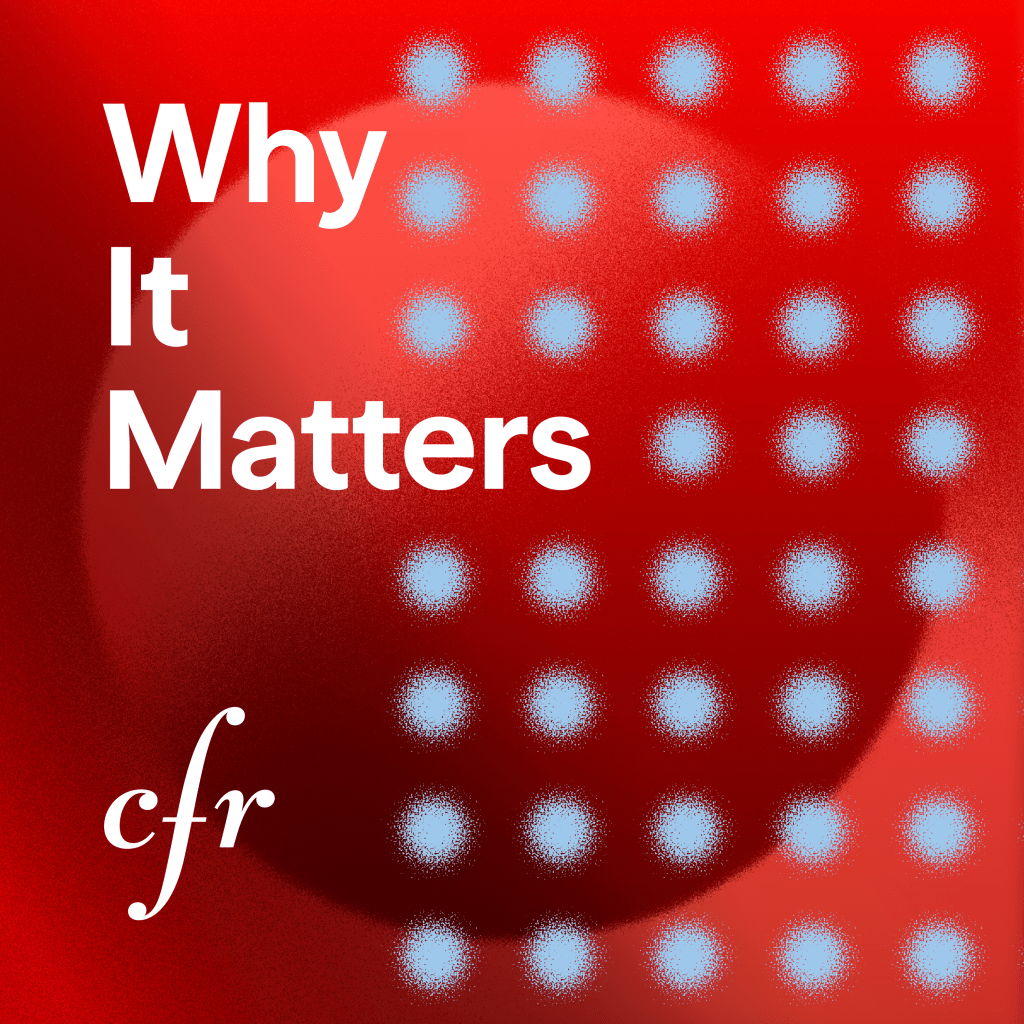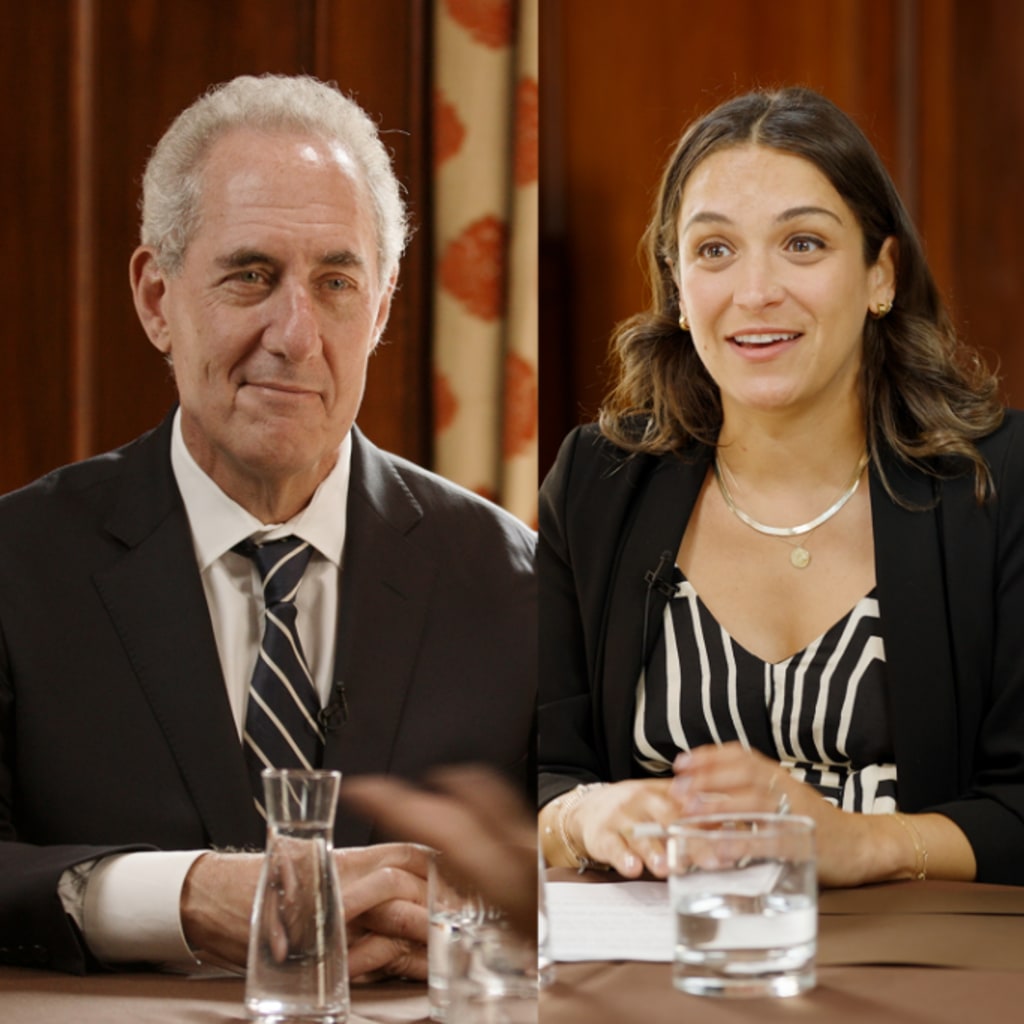Tariff Turmoil, Part 1: How Tariffs Are Affecting Farmers
Tariffs are often discussed in big, abstract terms—trade wars, economic strategy, global power struggles. But for ginseng farmers in Wisconsin, their effects are painfully personal. In this episode, Why It Matters dives into how tariffs work and how they’re hitting one of America’s most niche yet lucrative exports: Wisconsin-grown ginseng.
Published
Host
- Gabrielle SierraDirector, Podcasting
Guest
- Will HsuPresident, Hsu's Ginseng Enterprises Inc.
Audio Producer and Sound Designer
- Markus ZakariaAudio Producer & Sound Designer
Producer
- Molly McAnanyProducer, Podcasts
Show Notes
Will Hsu and his family have been farming ginseng in Wisconsin for more than fifty years. The medicinal crop is a prized export with deep roots in Chinese markets. But a sharp rise in tariffs is threatening to upend that relationship and crush an already shrinking industry.
This season, Why It Matters is taking you through the ins and outs of trade. In part one of our two-part episode on tariffs, Why It Matters unpacks the logic behind tariffs, explores how “leveling the playing field” doesn’t always work out, and hears firsthand how a family farm is being squeezed by an ongoing tariff war.
From CFR
Shannon K. O’Neil and Julia Huesa, “What Trump’s Trade War Would Mean, in Nine Charts”
Will Merrow and Christopher Shim, “Here’s How Countries Are Retaliating Against Trump’s Tariffs”
Edward Alden and Jennifer Hillman, “Donald Trump Wants Reciprocity in Trade: Here’s a Closer Look”
From Our Guest
Matthew P. Goodman and Allison J. Smith, “How Countries Stack Up on Trump’s Reciprocal Tariffs,” CFR.org
Matthew P. Goodman and Allison J. Smith, “On to Wisconsin: RealEcon Visits the Badger State, CFR.org
Read More
Chandelis Duster, “Did Tariffs Contribute to the Great Depression? Here’s What to Know,” NPR
Michael B.G. Froman, “China Has Already Remade the International System,” Foreign Affairs
Transcript
Will HSU: When you mention tariffs, it’s kind of reliving a nightmare. You are planting a crop that takes four to five years to reach maturity and really outlives a presidential election cycle. And so you have to make plans and forecast for the future, but today is very uncertain.
Jamie SYCHAK: These tariffs, section 232 tariffs, have in essence leveled the playing field, and we’ve had a pretty significant resurgence in our market and thankfully our plant’s still here. We’re thriving now. We’re back up over a thousand people. We’re working, we’re expanding, we’re making more products. That’s only because there’s a potential expectation for the market to be there in the future.
Debbie HENDRICKX: Well, here’s the thing. We’ve never exported before. We’re two months out of shipping our first shipment, so it’s already a very new process for us. We are a small company. So taking a big leap like exporting is a little bit scary in itself. Doing it in a year like this, when there is so much fluctuation, what is going to happen with the tariffs? How is it going to impact me? It definitely makes things a lot more stressful and challenging.
Any American in the business of importing or exporting is experiencing tariff overload right about now. You basically need a scorecard to keep up with what tariff is hitting which country. But what is crystal clear is that so far tariffs are the Trump administration’s tool of choice - used widely and frequently, with the stated purpose of protecting American businesses and markets.
But as we heard in our first and second episode of the season, it is hard to know what President Trump will decide tomorrow. This is feeding the uncertainty that has roiled global financial markets.
Why It Matters was interested in getting a ground-level view of how tariffs play out so we spoke with a local business owner, a steel manufacturer, and a ginseng farmer to hear what they think about tariffs and how Trump’s trade war could affect them.
I’m Gabrielle Sierra, and this is Why It Matters. Today, part one of our two-part episode on tariffs.
Gabrielle SIERRA: All right. Hi, Matt. Welcome back to the show.
Matthew P. GOODMAN: Hey, Gabby.
SIERRA: You’re officially a friend of the pod, I think.
GOODMAN: Wow, terrific. I’m delighted.
SIERRA: Well, we’re delighted to have you back.
This is Matt Goodman. He’s a senior fellow on trade at CFR. Last fall he went around the country on a listening tour as part of his REALEcon initiative and he helped us connect with the people he met along the way, who you will be hearing from in the next two episodes.
SIERRA: As you know Matt, this season we’re taking listeners through the ins and outs of trade. We have now reached the part where we dive into tariffs, and as we were preparing this episode, President Trump announced the most sweeping U.S. tariffs in a century, with worldwide implications, spurring fears of trade wars, recession, and a cycle of recriminations, and then he backed them off, but not all of them. The point is this is an ever-moving target and rather than trying to keep up I want to stay broad and understand what is happening and why it matters. So can we ask you to first define what a tariff is?
GOODMAN: Well, a tariff is basically a tax. It’s a tax on imported goods coming into the United States. It’s paid by the importer in the first instance, who brings the good into the United States. And then typically it’s passed on down the line ultimately to consumers.
SIERRA: How are tariffs supposed to protect U.S. interests?
GOODMAN: So, there are a lot of reasons that the Trump Administration and previous administrations have said they need to use tariffs to protect U.S. interests. One of them is to help protect developing industries in a particular country. So if the United States is trying to develop its electric vehicle industry, for example, it might impose tariffs on Chinese imported vehicles for a time to protect that so-called infant industry. That’s an old argument for tariffs going back to Alexander Hamilton, that’s one reason. Another reason is to address an unfair trade practice in another country. We have laws that allow trade negotiators to go out to other countries and say, “We want you to get rid of that trade barrier or that unfair trade practice, and we’re going to use tariffs if you don’t do that.” There are also arguments that it can raise revenue. Before there was an income tax, tariffs were the main source of revenue for the U.S. government, but that’s more than 150 years ago now. And that has not been the case that tariffs are such a major source of revenue, but they do bring in some revenue. And of course, there are two other arguments the Trump administration has been using to justify their tariffs. First, forcing investors, both U.S. and foreign investors, to produce in the United States behind the protectionist wall. And second, protecting national security. Neither of these arguments for tariffs is new, but they’ve rarely been applied so broadly to so many countries and products. So there are a number of reasons that are used to justify tariffs.
SIERRA: It does seem like these tariffs are being used to reward or punish countries based on other issues completely outside of trade like fentanyl trafficking. Why are tariffs the tool of choice here?
GOODMAN: Well, that’s a very good question, and a lot of people are asking that question. Usually, tariffs are used to address trade problems. It’s not entirely unprecedented to use them for other things, and there is this tool, the International Economic Emergency Powers Act, which was passed back in the 1970s, that allows the president to declare an international economic emergency of some kind, and then to impose anything really he wants, including tariffs. And so if it is true that fentanyl is causing harm to our economy or causing some kind of emergency, then in theory, the president can use this tool to do whatever he wants again, but that could include imposing tariffs. But this is the first time that tariffs have been used under that law for this particular purpose, and it’s already being challenged by people in Congress and the courts, and I think the jury is still out on whether it’s going to be possible to use tariffs under this law. So, we’ll see.
SIERRA: Are these tariffs extreme, in terms of what’s expected of a large global player like the U.S.?
GOODMAN: Yeah, I mean, the U.S. for the last 80, 90 years even, has been a champion of lowering tariffs, of trying to get other countries to reduce their tariffs and using the incentive of getting more access to our market as a tool to encourage countries to lower their tariffs. And so this is, again, not entirely unprecedented. We have used tariffs to raise barriers in the past, but it’s usually been pretty targeted to some particular trade problem that an administration wants to solve. Using them in this broad way to achieve other objectives and really suggesting that the direction of American tariff policy is going to be towards closing our market down, protecting ourselves, that’s really new and different from what we’ve really been doing for the last, as I say, going back to Franklin Roosevelt.
SIERRA: We’re here in New York, you’re in D.C. And we do tend to take a look at these issues from, as we say, 30,000 feet. But you actually embarked on a tour of the U.S. where you got to speak to people directly about trade in general, but also about tariffs. What did you learn?
GOODMAN: Yeah, for about nine months in 2024, we went to nine states kind of touching all the corners of the country from Florida to Oregon, and from New Hampshire to Arizona. And we met with local officials, local business people, workers, students, journalists, others. And we asked them about trade, among other topics, and got some really interesting answers. Including the fact that I think most Americans, at least the ones we talked to, which by the way was 400 plus people.
SIERRA: Wow.
GOODMAN: We heard some sort of complex views about trade. In other words, generally positive, but specifically worried about its disruptive effects, especially if jobs are moved overseas as a result of trade or other things that cause disruption in local communities. And so, it’s something that requires both actual policies to address those disruptions, and that’s been often missing I think, in Washington’s approach to these issues. And also, persuading people that actually the overall benefits of trade are positive. It does have downsides, but Washington is doing something to address that, and people come to believe that. That’s sort of the challenge ahead I think, for policymakers who want to advance a trade agenda.
SIERRA: This bridges us perfectly into a conversation we had with Will Hsu, a ginseng farmer you met in Wisconsin. I didn’t know that was a huge industry there, so that’s wild.
GOODMAN: Will was a great person to talk to because he, first of all, again, who knew that ginseng was a North American plant or that most of it was grown in Marathon County, Wisconsin? I certainly didn’t. We spent most of a day with him and saw his ginseng being pulled out of the ground and how it was produced and sold. And yeah, he really got slammed by that first round of tariffs in the first Trump Administration because when President Trump imposed tariffs on China, China pretty quickly retaliated and one of the first products they hit was ginseng from the United States, because China can get ginseng from other sources not only at home, but also from Canada, which sort of backfilled, to use the technical term behind American ginseng when it was cut off. So, Will is still suffering under those tariffs and now has this uncertainty about what’s coming next.
HSU: My name is Will Hsu, and I’m a ginseng farmer here in central Wisconsin and also president of Hsu’s Ginseng Enterprises Incorporated. And we retail, wholesale, and export ginseng around the world. We are one of the largest exporters of cultivated and wild American ginseng to Asia from the U.S. We also sell domestically. And so that’s how my dad started the business originally as an immigrant. He learned about ginseng when he was working for the state of Wisconsin, and then decided to quit working as a social worker to delve into the ginseng business.
SIERRA: And what percent does Wisconsin produce at large?
HSU: So Wisconsin produces over 95 percent of the ginseng grown in the United States. Because of the farm families that started growing it here over 100 years ago, this has been the hub of the ginseng industry for the last 100-some years.
There’s no doubt that ginseng is a major crop in Wisconsin. Just one acre of ginseng can rake in around $200,000 every crop cycle.
In the 90s, during its heyday, around 3,000 to 5,000 acres of land in Wisconsin was dedicated to farming ginseng. Marathon County, Wisconsin earned almost $70 million in sales during that period. But today, the ginseng industry in Wisconsin has been whittled down to less than 1,500 acres and is steadily declining.
SIERRA: What share does your family farm contribute to the Wisconsin ginseng market?
HSU: We produce here on our farms probably about 25 percent of the Wisconsin crop. We also process for other farmers, meaning other growers who are growing their own ginseng on their own farms. And so we wash and dry and process probably another 10 to 15 percent of the crop for other farmers here in central Wisconsin. In total, in any given year, roughly one-third of the Wisconsin crop flows through our doors, whether it be our own farm or other farmers. That would be roughly about 300,000 to 350,000 pounds a year. Which fresh, because this is a dried product we’re talking about, fresh it’s over a million pounds a year that will come through our facilities. We are probably the second or third largest producer here. Growing up, there were probably close to if not over 1,000 family farms in Wisconsin growing ginseng. The industry used to generate upwards of 2.5 million pounds. Today, we’re fewer than 80 left and shrinking and continuing to shrink. And less than a million pounds a year is being produced here. But we’re still the premier growing region for ginseng and ginseng consumers.
SIERRA: Did not know that we grew ginseng in Wisconsin, so I have about 10 million questions for you.
HSU: I will try to answer them all.
SIERRA: Oh, good. Just tell me a little bit about you. What is your background working in farming? When did you begin?
HSU: I grew up on our family farm. My dad started the business in 1974 and bought his first farm to begin farming ginseng in 1978. We’ve actually been in this industry for 50 years. I grew up working on the farm, grew up doing the weeding and picking rocks, picking seeds, harvesting ginseng, all the things that kids can do. And that’s why you have family labor on the farm. Really been involved with the business until I went off to college. I went to University of Wisconsin-Madison, did my undergraduate there, and then started working for General Mills after graduation. So almost 20 years that I was out of the family business and doing my own thing. And then my dad was diagnosed with cancer in 2011, and I came back to help out. Most of the farmers in this area are multi-generational. You don’t get into this industry without having grown up in it and grown up on a farm working in it, like many other farms. But this industry is unique because all the equipment is custom, all the knowledge and the know-how is custom because it’s a specialty crop. You can’t really easily learn it from anyone else unless they grow it themselves.
SIERRA: I want to know a little bit more about what ginseng is primarily used for. I feel like I only know it as a supplement. Is it multi-purpose?
HSU: Consumers use it for different reasons. It’s been known as a cure-all. In fact, that’s where the genus for all ginsengs is derived from. The genus is panax. It’s derived from the Greek word panacos, which is also the same root for panacea. It helps your body adapt to the stresses that you put on it. And so it’s one of those things where Chinese consumers, Taiwanese consumers, Cantonese consumers, if they are raised in this culture where traditional medicines are your only medicines, we didn’t grow up with western medicine, and so you take these herbs and these tonics and these products to help your body basically prevent disease. There are actually two primary types of ginseng that are grown and consumed around the world. There’s the Asian ginseng that is native to northern China and Korea. And it’s still used to this day medicinally. And it was the first ginseng that was discovered over 2,000 years ago during the Han Dynasty. Asian ginseng is stimulating, it’s heating. It’s very similar to caffeine as a stimulant. The American ginseng species, which is panax quinquefolius, is a more cooling, more tonifying type of stamina energy.
SIERRA: Okay so now I know what it is and why we use it. My next big question is why Wisconsin?
HSU: Starting in the late 1800s, shortly after statehood, there were immigrant farm families that moved to central Wisconsin and started transplanting ginseng from the woods, because the plant is native to the woodlands of the eastern U.S., and then eventually started cultivating the crop in fields. It is a very unique type of plant and crop because we grow it under synthetic shade. And we only use the land once and the crop takes four to five years to reach maturity. This isn’t a crop that you plant in the spring and harvest in the fall like many traditional row crops or cash crops, this is a multi-year, labor-intensive specialty crop that has to be grown under shade and under certain conditions, and so it’s because of the soil and the techniques that we’ve developed here. Very similar to wine making and wineries on the West Coast. They have unique climate, unique features, unique topography as well as processing that makes the product taste different than ginseng grown in other parts of the world.
SIERRA: Globally, who is your main customer? Do you mostly export or is it being purchased domestically?
HSU: We do both. We are one of the largest exporters of cultivated and wild American ginseng to Asia from the U.S. We also sell domestically. And so that’s how my dad started the business originally as an immigrant. He learned about ginseng when he was working for the state of Wisconsin, and then decided to quit working as a social worker to delve into the ginseng business. And so in the 1970s. We had a wave of new Chinese, Taiwanese, and Hong Kongese immigrants coming to the United States because we weren’t able to immigrate from Asia prior to 1965. And so with this new wave of immigrants coming in to seek education, to get undergraduate and master’s degrees, they had the purchasing and the desire to bring this product back to their families.
SIERRA: Let’s talk a little bit about that. You said one of your main customers is abroad; people from China, Taiwan, Southeast Asia. What, if anything, are you most worried about when it comes to tariffs? How are you feeling about all of this?
HSU: As a ginseng farmer, I’m fortunate or unfortunate to have had six or seven years to already process my feelings on this. So, we were impacted initially during the first phase of the trade war in 2018. So in 2018, the tariffs on ginseng at that time were approximately 12 percent or 13 percent. And then at the start of the trade war, they went up to 32 percent, I believe, and then with the next round of retaliatory tariffs, 42 percent.
Ginseng is taking one of the biggest hits in the trade war.
It’s a huge consequence to rural America and certainly to Wisconsin’s agricultural sector.
Six weeks out from this year’s ginseng harvest, about 50 percent of last year’s crop is still unsold.
These tariffs didn’t only have an effect on ginseng in Wisconsin, but also products like cranberries and soybeans. It’s estimated that the tariffs from the first Trump administration affected more than $3 billion worth of U.S. goods.
In response to these tariffs, China pushed back, and the U.S. lost $20 billion in annual farm exports between 2018 and 2019. Mexico and Canada also imposed their own retaliatory tariffs on U.S. goods, adding up to $15 billion. And this year, Canada doubled that, imposing tariffs on $30 billion worth of imported goods from the U.S.
HSU: Before Trump left office, he negotiated a deal with China, and they repealed or allowed the exemption of that final 10 percent. But, the tariff has still remained at 32 percent. And so we’ve been dealing with it since then. And you can see the impacts on our industry. The number of farms have declined, our planted acreage as an industry, our harvests have continued to decline year over year. The number of farmers has declined significantly. And so all of these are the impacts of tariffs that we’ve experienced over the last six to seven years. So when you mention tariffs, again, it’s kind of reliving a nightmare. You are planting a crop that takes four to five years to reach maturity and really outlives a presidential election cycle. And so you have to make plans and forecast for the future, but today is very uncertain. And tariffs make it even more uncertain because you don’t know what they’re going to be. If you were to tell me the tariffs are going to be the same four years from now, then my plans might be different. But the tariffs could be higher, they could be lower, so that really makes the guesswork harder as a farmer because we’re already subject to so many variables over a four to five year timeframe. And so when you can’t control those things, I think, people don’t know how to weigh the risks, and then the risks don’t outweigh the benefits. And so that’s why I think you’re starting to see fewer and fewer people farm. You’re starting to see family farms decrease dramatically because the risks just outweigh the benefits and the payoffs.
SIERRA: But isn’t the case being made for tariffs that they’re intended to protect American industries? Because it seems like this is hurting U.S. farmers especially since China and other countries have shown that they’ll retaliate.
HSU: I understand the idea that tariffs are supposed to help level the playing field because the tariffs being charged by an importing country might be higher or lower than the tariffs that the U.S. charges. But what I think that fails to recognize is that there are just certain countries and nations that are able to produce goods and products at a cheaper cost than other countries are. The U.S. can’t produce avocados as cheaply and as effectively for a number of reasons than, say, Mexico. Wisconsin can produce some of the best ginseng in the world, maybe at a higher cost, but consumers are willing to pay those costs. But then when you add tariffs onto it to protect Chinese producers of ginseng, that’s what China’s going to do; they’re going to do the same thing that we’re trying to do. If we raise tariffs, they’re going to raise tariffs. So it doesn’t really level the playing field.
I said we weren’t going to try to keep up with the ever changing news, but it is worth noting that since we spoke with Will, China has done just that. In response to U.S. tariffs, China has retaliated, first imposing an 85 percent tax then, most recently, raising tariffs on U.S. goods to 125 percent.
And as of last week, the tariff for ginseng to be imported into China jumped from 32.5 percent to 66.5 percent. And you know what, it might have gone up since I recorded this.
HSU: And so some Chinese consumers will be very willing to just say, “Fine, because of tariffs, because we don’t have trade agreements, because I can’t buy this product cheap enough, I will just live without American ginseng from Wisconsin.” And we’ll have to do the same here in the United States.
SIERRA: How have tariffs and this tenuous relationship with China already impacted your customer base?
HSU: Ginseng is uniquely positioned to be an export product. I don’t have another market that I can develop overnight for ginseng. This is a product that is used almost exclusively by Chinese consumers because of our culture. I can’t replicate that. 95 percent of our consumers are of Chinese or ethnic Chinese descent. If we don’t have access to those markets, if we don’t have that brand reputation as being the best ginseng in the world that is easily accessible by consumers, we don’t have business, we don’t have a market.
SIERRA: What will ginseng production look like in the U.S., if Wisconsin loses that market and steps back from being a large producer?
HSU: I think we’ll then just become a niche producer. You see this in other industries where either as market demand wanes or as consumer sentiment changes, they just become a niche player. They end up going into higher end or more luxury style or smaller volume type of goods. But that doesn’t help farmers, that really only helps retailers and resellers of the product. It doesn’t help farmers. And so I think that’s really the crux of the issue right now is that for over 100 years, ginseng has been grown here in central Wisconsin and demanded and pursued by Chinese consumers. That may not be the case in the future if we’re just a niche product.
SIERRA: What would increase the incentive for farmers to remain in this industry? What do you see the trajectory for ginseng production being in the future?
HSU: I think short-term, production will probably decrease due to age of the farmers, retirements, not having a next generation to come in and farm the product. And just the general economic and political environment is not conducive to prices increasing. I do think you’re going to see, industry-wide, a very similar trajectory to what you saw with dairy farming here in Wisconsin as well as more recently some of the cash crops, corn, soybeans, et cetera. If we’re not going to trade and export those products, if we don’t have stability and certainty about the future trade environment, prices will remain more volatile, but more than likely either stable or decrease because there’s just not the same level of demand. And so I do think you’re going to see a decline in the number of farmers, you’re going to see a decline in producers, you’re going to see a decline in poundage produced. The problem is the ones that reap the rewards in the future won’t be the ones who are here today. And I think that’s the hardest lesson that we’re going to learn as a capitalist system is that somebody in the future is going to benefit at the cost of today.
SIERRA: Wow. Well, Will, thank you so much for being with us. I can’t even tell you how much I’ve learned from this conversation. Truly, I really appreciate you joining us today.
HSU: Yeah, no problem. It’s been an honor to be a guest.
Next time on Why It Matters...
GOODMAN: There’s a lot of uncertainty that’s been created here that is making it hard for business owners all across the country. Are we going to buy that factory or build that new plant, or are we going to export, import? What are we going to do? But if you can’t know whether these tariffs are going to stay in place or not, it’s very hard to make business plans that you can confidently rely on.
In one week, we’re picking up where we left off with part two on tariffs featuring Matt and two new guests. Stay tuned.
For resources used in this episode and more information, visit CFR.org/whyitmatters and take a look at the show notes. If you ever have any questions or suggestions or just want to chat with us, email at [email protected] or you can hit us up on X at @CFR_org.
Why It Matters is a production of the Council on Foreign Relations. The opinions expressed on the show are solely that of the guests, not of CFR, which takes no institutional positions on matters of policy.
This episode was produced by Molly McAnany, and me, Gabrielle Sierra. Our sound designer is Markus Zakaria. Our interns this semester are Isabella Hussar and Jo Strogatz. Robert McMahon is our Managing Editor. Our theme music is composed by Ceiri Torjussen.
You can subscribe to the show on Apple Podcasts, Spotify, YouTube or wherever you get your audio. For Why It Matters, this is Gabrielle Sierra signing off. See you soon!






